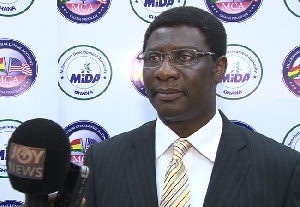Business News of Monday, 19 September 2016
Source: Public Agenda
Coalition alleges fraud in ECG privatisation process
The Millennium Development Authority (MiDA), the Agency responsible for the implementation of the Ghana Power Compact, has been accused of falsifying documents prior to the conclusion of the deal, thus raising concerns about the credibility of the concession programme.
A coalition of civil society organizations kicking against the privatisation of the Electricity Company of Ghana (ECG) alleged at a forum last Tuesday that the process is fraught with irregularities and outright fraud.
The Coalition, which comprises Wacam, Association of Ghana Industries (AGI), the Integrated Social Development Centre (ISODEC), Public Utilities Workers Union (PUWU), and the Third World Network indicated that, the falsification manifested in documents in its procession, prepared by (MiDA), in the name of the Public Utilities Regulatory Commission (PURC) and the Energy Commission (EC).
Addressing the forum, Mr Richard Asante-Yeboah, a member of the coalition pointed out that MiDA has been guilty of forgery on two occasions. Mr. Asante-Yeboah cited the Draft Tariff Methodology document of the PURC and a statement in the name of the Energy Commission to which the PURC and the Energy Commission have both issued disclaimers.
“The development makes it difficult for fair-minded people, especially staff of the ECG, to trust the process leading to the grant of the concession,” he stated.
Mr Asante-Yeboah also revealed that, when MiDA called for requests for proposal, the ECG workers' proposals were all ignored.
That, he said, meant that the views of the workers had been relegated, underscoring their fears that their jobs were not safe after the first five years of the deal. Contrary to assurances that assets of the ECG will not be sold, Mr Yeboah asserted that “all assets, apart from the headquarters and training school, are up for sale.”
However, the Head of Reforms Unit at MiDA, Mr Michael Awuah, who represented the Authority at the forum, said the claims were untrue, but declined to make further comment, adding that he was not competent to comment on the issue as it was in court.
Under the Power Compact, which has already entered into force, six projects namely ECG Financial and Operational Turnaround Project, NEDCo Financial and Operational Turnaround Project, Regulatory Strengthening and Capacity Building Project, Access Project, Power Generation Sector Improvement Project and Energy Efficiency and Demand Side Management Project, will be implemented to address the root causes of the unavailability and unreliability of power in Ghana.
The Associate Executive Director of Wacam, Mrs Hannah Owusu-Koranteng in her address, revealed that the terms of the Compact II indicates the Public Utility Regulatory Commission will have no powers in determining the tariffs.
According to her, if the deal goes through, utility tariffs will be determined by the International Finance Corporation (IFC) which is in contravention of PURC Act, (Act 538).
She stated that if MiDA has its way it will render PURC “almost useless”.
“Even the labour laws could be set aside…it is a serious issue,” she asserted.
She is convinced that the concession deal will spell doom for the Ghanaian people because Ghana's most important resource, power, will be governed by forces beyond its borders.
The Public Utilities Workers' Union (PUWU) also reiterated its objection to the Compact which is expected to last for 25 years.
The General Secretary of the PUWU, Mr Michael Adumata Nyantakyi, said “the regulations guiding the deal subjudicates the laws of the country.
He said government failed to explore other forms of investment avenues just to settle on concession as a result of condition precedent. Mr. Nyantakyi said the deal would lead to high tariff regime, and mass layoffs of workers, and was skeptical that it would benefit the larger society.
Entertainment












